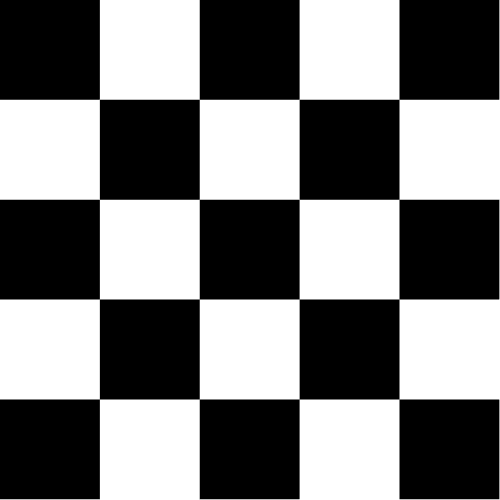SEO Twitter on Fire: Can AI Algorithms Be Biased?

It all started with Lidia Infante posted this on twitter for John Muller:
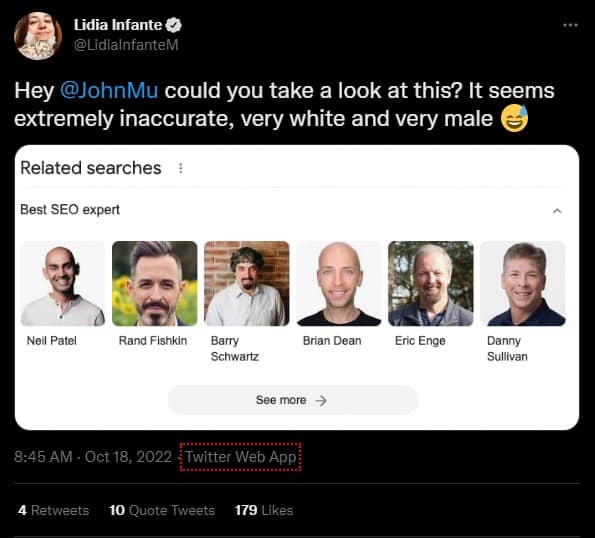
I mean it's a legitimate comment! Why is a search for "SEO Expert" returning an all male list given that there are many successful female figures in the industry?
But then, CF, a UK based SEO replied to this tweet saying:
"aren't you supposed to be in the SEO industry? Google is just scraping the data from other sources, it's not the Algo giving preferential treatment to men or white people...."
He then continued:
"Do people seriously think my issue with this is somehow political diversity? NO! I couldn't care less for politics, I just think we should do better as an industry & stop complaining about things that are within our power to change - Heard many excuses why we can't, when we can."
Which set SEO twitter on fire. Many were rightfully upset about those comments, that raised the question, can Algorithms be biased? or it's just there are not enough women "SEO experts"?
Women in SEO
Let's start with the simple more obvious question, are there not enough women experts in SEO whom deserve a spot in Google's SEO expert carousel?
Here's a bunch for starters:
- Aleyda Solis
- Lily Ray
- Areej AbuAli
- Lidia Infante
- Kristina Azarenko
- Marie Hayne
- and many many more!
I don't think I need to argue the obvious and debate that many women ARE crushing it in the SEO world, so I'll leave this here.
Can Algorithms be Biased?
Short answer is YES, for many reasons including:
- Algorithms are written by humans whom can be biased.
- AI algorithms are trained on data sets that can also be biased.
Algorithmic bias has recently been addressed in legal frameworks, such as the European Union's General Data Protection Regulation (2018) and the proposed Artificial Intelligence Act (2021). ~ Wiki
In fact, acknowledging that AI algorithms can be biased is considered as common knowledge as mentioned by the National Institute of Standards and Technology that's part of US National Department of Commerce:
"It is relatively common knowledge that AI systems can exhibit biases that stem from their programming and data sources; for example, machine learning software could be trained on a dataset that underrepresents a particular gender or ethnic group."
Do We Really Have a Bias Problem on Google?
I mean, is there really a problem? Well, here's another interesting example. I searched for "hoodie" on Google, a supposedly neutral search term... Here's what I got:
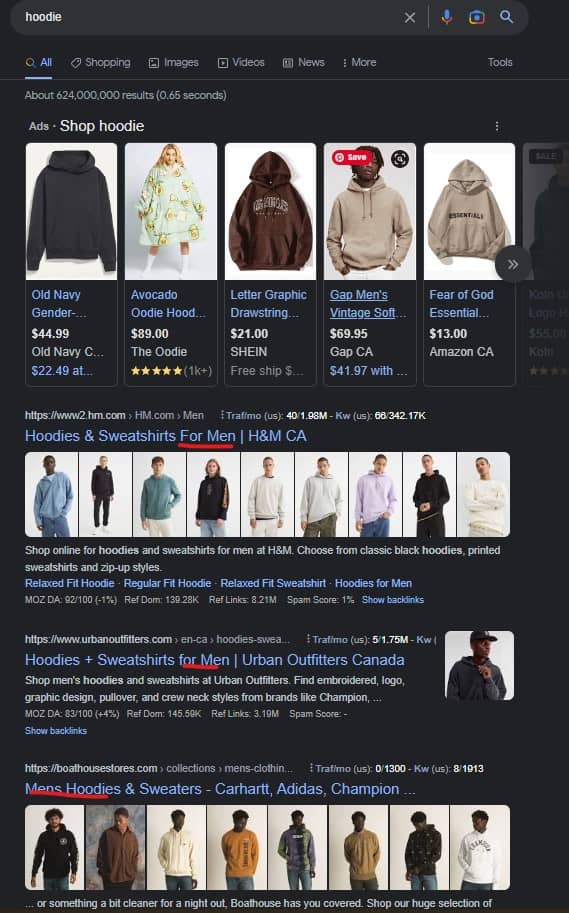
While the Ads results were much better with a "gender-neutral" result from Old Navy leading the sponsored products carousel, all the organic results where male-oriented....
I looked it up again in SEMRush, and it's almost the same:
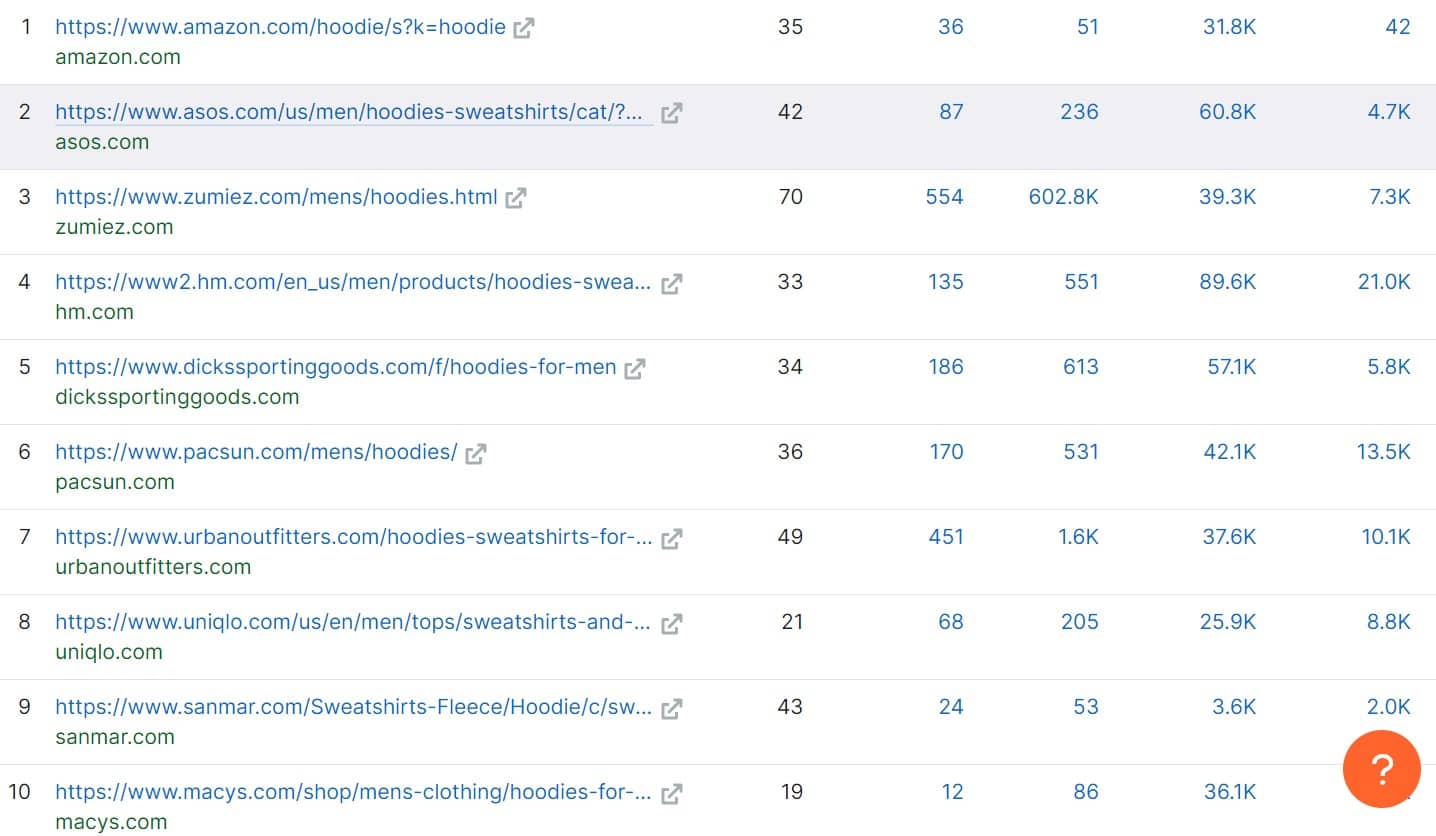
Here's the list in case you want to check them out:
- https://www.amazon.com/hoodie/s?k=hoodie (men)
- https://www.asos.com/us/men/hoodies-sweatshirts/cat/?cid=5668 (men)
- https://www.zumiez.com/mens/hoodies.html (men)
- https://www2.hm.com/en_us/men/products/hoodies-sweatshirts.html (men)
- https://www.dickssportinggoods.com/f/hoodies-for-men (men)
- https://www.pacsun.com/mens/hoodies/ (men)
- https://www.urbanoutfitters.com/hoodies-sweatshirts-for-men (men)
- https://www.uniqlo.com/us/en/men/tops/sweatshirts-and-hoodies (men)
- https://www.sanmar.com/Sweatshirts-Fleece/Hoodie/c/swe-hoodie (men & women)
- https://www.macys.com/shop/mens-clothing/hoodies-for-men?id=25995 (men)
Another example mentioned by Hannah Thorpe where she links to a very interesting study:
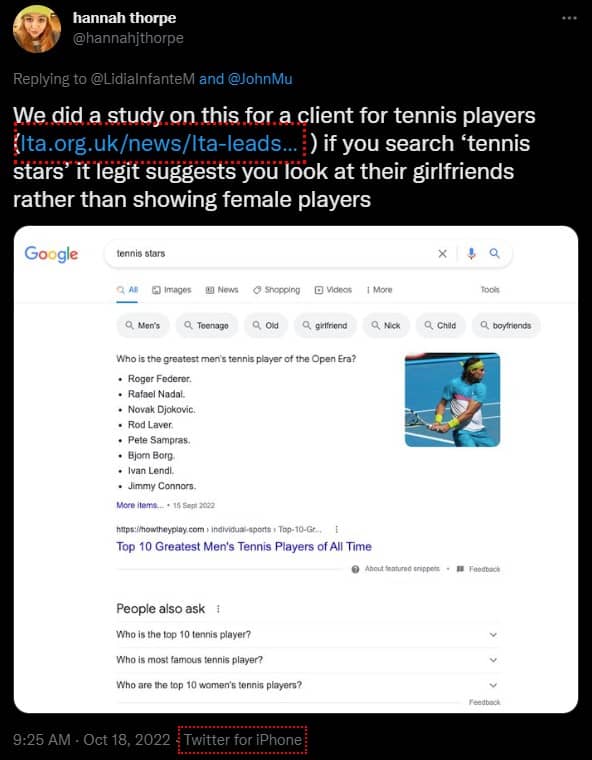
The study highlights the extent to which male focused content and information dominates results provided for generic search terms about tennis players. Some of the findings include:
- For generic “best” or “top” queries (i.e. those which do not specify a gender or player’s name); the ‘Athletes Carousel’ of player profiles and images featured at the top of Page 1 search results is very heavily skewed towards male professionals over female, with 79% of the available slots across all queries returning male players (for some search queries, as many as 98% of the available slots were male).
- Where Video results were shown on page 1 for generic “best” or “top” queries, 230 of 269 available slots showed clips of male tennis players as the preview frame and as part of the key moments sections (allowing searchers to skip to different sections of the video), accounting for 86% of the available slots. Video frames containing women only accounted for 14% of available space
- Looking specifically at Image Search results for generic queries, 78% of images displayed ‘above the fold’ (without the need to scroll) depicted male players, compared to 15% depicting female players, and 7% showing mixed results (males and females together)
- Within the ‘People Also Ask…’ section (those results surfaced as being related additional queries people go on to search), for the first four options provided for each query, 236 of 256 slots related to content surrounding male players, dominating 92% of the immediately available People Also Ask results
- Tagging of content by content providers is perpetuating the bias. Where pages were originally created to focus on men’s tennis, but have since been updated or edited to be more inclusive of women’s tennis, the title tags and urls have not always been updated, restricting the visibility of women’s content in search results.
Conclusion
More work needs to be done to make sure that search results are not biased for one reason or the other. It's not just about "tennis players" or "SEO experts" or even generic clothing terms like "hoodie"... we need a core update!
Doesn't that align with Google's goals of returning the most helpful reliable trustworthy results to users? specially users who live in 2022 and have high expectations from the tech giant when it comes to women representation in SERPs....
The SEO Riddler Newsletter
Join the newsletter to receive the latest updates in your inbox.
